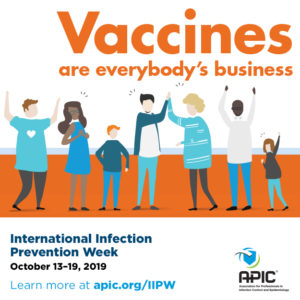Anyone working in a healthcare setting pays extra attention to infection prevention. With so many different people carrying infectious diseases in closed areas, infection control is a priority.
This week marks International Infection Prevention Week (October 13-19) and highlights the constant vigilance needed to keep infection control in the forefront. Sponsored by the Association for Professionals in Infection and Epidemiology (APIC), the week is a reminder to the crucial way infection control safeguards individuals and larger communities.
There’s more to stopping the spread of germs than simply washing your hands. Although hand washing is extremely important, nurses can also adopt other practices to help stop infections from spreading from person to person (and to avoid becoming a patient themselves). They are also a good resource for patients who can learn good infection control methods and also learn about other prevention methods including vaccinations.
Wash Your Hands
Nurses’ hands require near constant cleaning with soap and water or antibacterial gel. Because nurses touch everything from patients’ bodily fluids to medical devices to food, having clean hands is the top way of keeping infections in check. Nurses know this, but it’s also important for them to share this information with their patients and families. Whether it’s visitors to the nursery or family members who are taking care of wounds or stomach infections at home, this is one activity that cannot be stressed enough.
Protect Clean Surfaces
Everything a nurse touches has the potential to spread germs or infectious illness. Being mindful of the surfaces you touch, whether you are wearing gloves or not, helps you stay healthy and protects your patients.
Promote Vaccinations
Staying up-to-date on your own vaccinations helps protect you from preventable diseases and is a key to infection prevention. A flu shot every year, required by some healthcare organizations, is protective as are routine vaccinations to prevent tetanus or pneumonia (if you’re eligible). With the recent explosion of measles cases across the country, you can also help educate your patients on the safety and effectiveness of vaccines to keep serious and potentially deadly diseases out of their own homes and communities.
Know Proper Procedures and Protocol
Some nurses are exposed to extremely contagious and dangerous infectious diseases. Outbreaks of Ebola have caused infectious in the healthcare workers helping patients, for example. Knowing your organizations protocol for handling such cases or for handling outbreaks is essential. If you aren’t sure about the current protocol and process, keep asking until you find out or until a protocol is established. Flu outbreaks are common in the wintertime, but in our increasingly global world, outbreaks of other diseases that have primarily been in other countries can easily jump to any area. Nurses have to be ready to handle whatever might evolve.
As a nurse, infection control is a big part of your responsibility to your patients, but it’s also a responsibility to yourself. Remaining as healthy as possible lets you care for and protect your patients.
- WOC Nurses Week Highlights Specialty - April 16, 2024
- Honoring Radiology Nurses Day on April 12 - April 12, 2024
- Travel Offers New Career Possibilities - April 8, 2024



